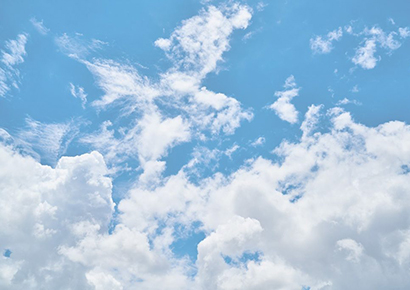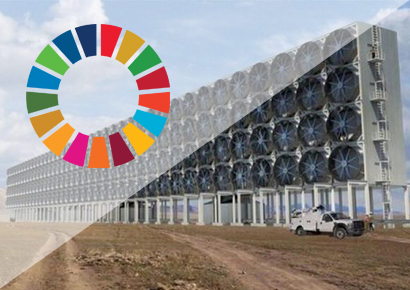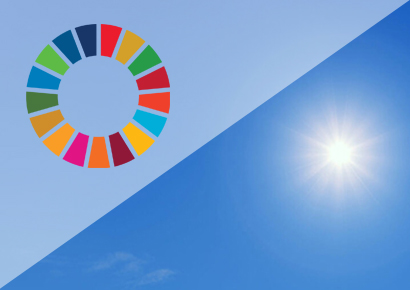C2GTalk: An interview with Ambassador Elizabeth Thompson
Are we going to be at the table when climate-altering approaches are considered?
17 December 2020
Island peoples may well consider climate-altering approaches, like carbon dioxide removal and solar radiation modification, because of the existential threat posed by climate change, said Ambassador Elizabeth Thompson during a C2GTalk interview. One of the main challenges, in her view, is how to ensure that the most vulnerable will have a seat at the table when these approaches are considered.
Ambassador Elizabeth Thompson is the Permanent Representative of Barbados to the United Nations. She has worked in development policy for nearly 25 years. She served as an elected Member of Parliament from 1994 to 2008, and at various times as Minister of Energy and Environment, Housing and Lands, Physical Development and Planning, and Health.
Ambassador Thompson served as Assistant Secretary-General of the United Nations as one of two executive coordinators at the Rio+20 Conference on Sustainable Development, and engaged in a number of advisory roles within the UN system, including on the transition from the MDGs to the SDGs, in the Office of the UN Secretary General, UNDP, the President of the General Assembly and on the Secretary General’s global energy initiative, Sustainable Energy for All (SE4ALL).
Below are edited highlights from the full C2GTalk interview shown in the video above. Some answers have been edited for brevity and clarity.
Click on the play icons below to watch the quoted parts of the interview
Let’s turn to the specific climate impacts we are seeing in your region at the moment. From your perspective and that of other island peoples – what is the severity of the moment we face right now?
In the Caribbean, it’s a very real problem. It has to do with the increase of extreme weather events. Dominica, two years ago with Hurricane Maria, had 250% of its GDP wiped out in a few hours. How does a country come back from that? The island of Barbuda—the entire population had to be relocated. These are devastating impacts socially, economically and culturally. In terms of the individual quality of life, sense of self and security—people lose everything.
And then there is the incremental creep that also has significant impact: Ocean warming, which affects the habitats of marine species that then impacts the life of fishers and fisherfolk. Coastal inundation, coastal damage, beach erosion and beach loss, which impacts tourism-earning economies. Increased dryness, aridity, impacts on the soils, which affects your capacity to grow food and become food secure, so you become even more dependent on imports, for which you don’t have resources. It means a diversion of budgetary resources to deal with climate impacts, instead of putting that money into healthcare or education or housing.
In the Caribbean, in Small Island Developing States, in Africa, and in the Pacific, we are living the reality of climate change. So it is impacting our quality of life—but most significantly, it is impacting the future that we desire to have.
In terms of response, the priority has been on cutting CO2 emissions—but there are also additional approaches now being considered, such as large-scale carbon dioxide removal and solar radiation modification. In your view, how ready is the Global South to consider some of these approaches?
I think that because the problem is such an immediate and existential one for island peoples, we certainly are willing to consider the use of technological interventions in grappling with the problem.
The challenge is: Are we going to be at the table when these new technologies are being considered? What will be the impacts on us? To what extent will we be victims of the technology—in the same way that we’ve been victims of climate change—rather than having the opportunity to understand and influence at the very early stages before there is complete rollout? To what extent will there be ownership of these technologies by island peoples, so that they can be appropriately adjusted or scaled for our particular considerations, or so that the adverse impacts are not exacerbated in our own conditions on in our countries, rather than are getting the benefit of the technology?
At the level of the universities and the scientific community within the islands, there is discussion and understanding of these new technologies, even if not complete engagement from those who are leading the discussions on the issues.
On the other hand, the information level outside of the scientific communities is really quite low. If people are unaware of a technology—don’t fully appreciate how it is proposed to be deployed, what the options are, where they fit in, what are the governance rules, how these rules impact them—then they’re not in a position to educate populations, to make informed choices, and to consider the risks versus the benefits.
My concern is that there is a low information level amongst policymakers, who are going to be making the critical decisions and have to be at the table.
You mentioned governance, which is a very broad process that includes learning, discussing, and taking decisions. What kind of frameworks do you think could be helpful to put in place to help people learn, discuss and make decisions on whether or not to deploy climate-altering approaches, in a way that maximises synergies and minimises trade-offs for the Sustainable Development Goals?
I think if we start inclusive discussions in the multilateral system—within the context of the United Nations or a set of regional conferences, perhaps—so that a discussion, a level of understanding, and a level of interest is initiated, then we are more likely to have better responses, rather than bringing in people in the backend.
And it isn’t just governments to which I’m speaking. Clearly, civil society and populations have a significant interest in these outcomes and these approaches. The UN does have a Civil Society Forum and there are powerful NGOs across the world. Let’s face it, there are very powerful lobby groups, and either they are going to be able to bring their influence in a positive way and embrace what is happening or they are going to be actively working against deployment of the technologies. That sometimes comes from lack of understanding, from lack of inclusion in the discussion at the very early stages. Or it may come from the fact that there are genuinely opposed because they don’t see the benefit or that they think that the risks outweigh the benefits. Trying to engage civil society, and having discussions with populations through the NGO community and civil society I think certainly is a way to start that global interaction.
The UN is really yet to have any large meeting on this issue. The UNFCCC, for instance, is yet to have a large session which includes a conversation about solar radiation management.
Drawing on your experience as a Member of Parliament and someone who held multiple ministerial positions, what are the kinds of things that would make politicians sit up and take notice about some of these carbon dioxide removal or solar radiation modification approaches? Is it science-based or is it also issues around economic opportunities and other potential challenges that have emerged?
We’ve so often spoken about climate issues and environmental issues in the context of doom and gloom, but we have not spoken to them as opportunity—opportunity for an improved quality of life, opportunity for change that benefits and is more inclusive for a larger number of people, economic opportunity, business investment opportunity, an investment in the future for young people, and so on.
I think that this is an important lens through which we have to consider the climate issue: To what extent are there positive opportunities being created out of this crisis for us to have a more holistic approach to how we manage environmental issues as social and economic issues? That is an important conversation that needs to take place. I think if we frame it in that way, ministers of finance, who tend to be the more powerful ministers in the cabinet, are going to listen more attentively.
You experienced COVID-19, and you mentioned the interface between science and policy. How has the pandemic and what we’ve been through recently changed the way science and policy interact? Does that have an effect on how we think about climate change?
I think that we are learning that we have to be more respectful of nature—that Mother Earth is called Mother Earth for a reason and as her children, we must not be abusive of her and we have to recognise that what we do to Mother Earth we do to ourselves. We are getting that change of behaviour and that recognition that planet, profit and people don’t have to be mutually exclusive—that we can work toward a people-centred planet that allows for profit without abuse and exploitation. That is really of extreme importance.
I think COVID-19 has made us ask questions like, how can I live a better quality of life? All of the things that I was rushing around doing, how important are they really? What are my priorities? Do I need to connect more with loved ones because life is so fragile?
It has also made us recognise that the absolute faith that we had in man-based systems and technologies is perhaps misplaced—that they are not as infallible as we believed. At the same time, man’s ability to innovate, to find a vaccine in record time suggests that where we are willing to put effort, where we are willing to put emphasis, where we are willing to put resources, we are able to engineer solutions.
And that is why, what is happening in relation to climate change and what could almost be described as climate genocide that is being perpetrated against developing countries and Islanders, in particular—that is what makes it such a tremendous tragedy: that it is avoidable, that there are solutions, and that with effort, emphasis and resources, we could beat this if we wanted to.
Some of the climate-altering approaches that have been discussed starts to tread onto areas which some people describe as playing God. How important a role do you think faith and religion and other ethical frameworks will have in taking these decisions?
I think that people use faith in an obstructionist way. But I am a Christian. The Bible tells us that we are made in God’s image. And if that is true, then God makes us infinitely capable of engineering, of imagining, of innovating—and we have a responsibility to use those skills for good and for the benefit of the human family.
And let’s think about it really. We have been playing God for very long time—from the time we invented vaccines and stopped natural death and natural selection. We’ve been playing God every time we save a premature baby, which nobody says not to do. We’ve been playing God when we sent people off to the moon and sent an exploratory spacecraft to look at Mars.
We’ve been playing God for a very long time and in very many ways and we are going to continue to do so. And I don’t know that it is wrong because if we are made in God’s image, and if we accept the infinite potential and capabilities that He places within us, then we must also accept that they are placed to be used for the good of humanity and for the good of the planet on which we live.
We deal in climate with some really quite challenging issues in terms of how we take them on emotionally. At the same time, we have to keep on going. How do you maintain a hopeful approach to life, even at such a difficult moments in humanity’s journey?
Hope springs eternal in the breast of man. And that really is true. Ultimately, we recognise that life is about getting on with the business of living, with the joy of living, with the connection of living.
Even though there are crises—whether it’s a crisis of COVID, whether it’s a crisis of climate—these are not the first crises that the world has faced. We have had World Wars. We have had pandemics. We have had physical and environmental devastation. But we have survived. We have managed to pull ourselves back from the brink of disaster.
When we looked back on how war had hurt humanity, we formed the United Nations. When we looked at how we were having various challenges that threatened our species, we found solutions—and we will do so again.
Man has ultimately found a way to survive and to succeed. I think that the God in us really saves us and causes us to save others, to save our planet. So even when we become our worst selves, humanity recognises the value of our planet and the dignity of the human family and we act to enhance and protect it. And this is what we are going to do now, this is what we absolutely have to do now, and I believe that we will.


